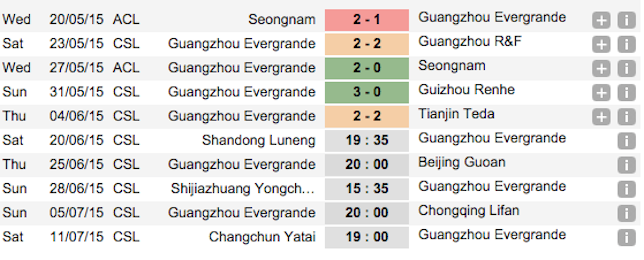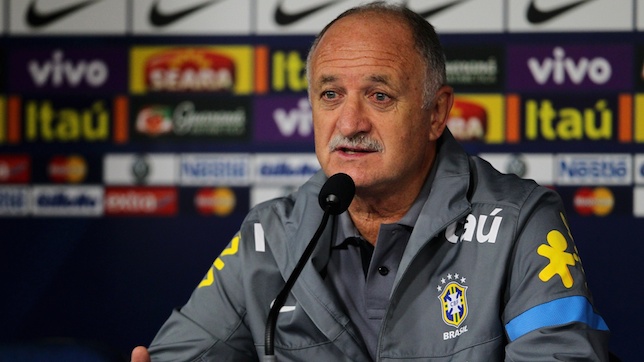The wind of change swept across Guangzhou on Thursday evening as dramatically as any of the city’s regular and dramatic storms thus far this summer. No sooner had the four-time Chinese Super League champions secured a 2-2 draw with Tianjin Teda than the announcement came—Fabio Cannavaro’s brief tenure as manager was over. In his place, Brazilian veteran Luiz Felipe Scolari.
Evergrande are not unaccustomed to shock sackings of managers, having disposed of Korean Lee Jang-Soo in similar fashion just three years ago. Then, as now, they were not only reigning champions but also top of the league table (or level on points) and advancing in the AFC Champions League.
Given the extent of the club’s current injury crisis—with seven first-team regulars absent against Tianjin—Cannavaro’s exit is a decision which has shocked many. Results have been improving, in spite of selection concerns, and there was no prior suggestion of an impending change. Football can be a ruthless sport and nowhere more so than in China.
I announce that earlier today i have reached an agreement for the consensual resolution of the contract with Guangzhou Evergrande
— Fabio Cannavaro (@fabiocannavaro) June 4, 2015
Thanks all the executives and all the players for the wonderful experience
— Fabio Cannavaro (@fabiocannavaro) June 4, 2015
I leave the Team 1st in Super League and in the quarterfinals of the Asian Champions League. Never Give Up! — Fabio Cannavaro (@fabiocannavaro) June 4, 2015
Speaking to several agents, coaches and players within the Chinese game on Thursday night, Evergrande had once again managed to keep their intentions under wrap. While focus should have been on the disgraceful scenes in Guiyang—where confrontation saw a match official strike Shandong Luneng manager Cuca—the game was in a state of shock as to Cannavaro’s fate.
Respected Sina reporter Yu Jing was the first to come out with reaction from within the club regarding the sudden change of leadership. The view of the Evergrande hierarchy, it is reported, is that Scolari’s style better suits the club’s expensively compiled and largely Brazilian foreign players. Rather than a dismissal based on results, the move is being portrayed as being with a long-term view to how the club wish to progress. The Italian era is over and Brazil is now the focus of the club’s development strategy. With rumours of a Chinese offer for Scolari already six weeks old, it is a change some time in the making.
Like him or not, the Brazilian will offer something very different. Cannavaro’s Evergrande have been free-flowing in attack but leaking goals with alarming ease in defence. Scolari is not a man known to accept such frailty—even if many will point to his Brazil side’s alarming 7-1 loss to Germany last summer. That defeat, and the manner of it, owed more to mental capitulation in the cauldron of the Mineirão than any deep issue with his tactical setup. Until then, Brazil’s 18-month spell under his management had brought strong results against big nations based on a hard-working, disciplined tactical system.

Scolari’s unveiling on Thursday evening
“Aesthetic considerations will not be very high on [Scolari]’s list,” wrote BBC South American football correspondent Tim Vickery following his appointment as Brazil manager in 2013. “He is a dyed in the wool pragmatist. But that does not make him easy to pigeonhole. He made his name in the 90s with rugged club sides which tended to play 4-4-2 with a big, target man striker.
“But when he got his hands on the national team in 2001-02 he did something completely different. When he took over, not even Scolari himself could imagine that he would end up playing with three centre backs and a front three of Ronaldo backed up by Rivaldo and Ronaldinho. But he saw it as the best way to take advantage of the characteristics of the players available to him.”
The issue is, since that World Cup in 2002, Scolari’s CV is chequered. A positive run with Portugal saw him come close to winning the European Championship, but he was quickly dismissed as manager of Chelsea when chancing his arm in England. With Uzbekistan’s Bunyodkor he was relieved of his duties after less than a year following AFC Champions League failure, while a Copa do Brasil title with Palmeiras hides the fact his reign with the club lurched from one disaster to another playing uninspiring long-ball football. He would eventually leave the side in deep relegation trouble.
While the Confederations Cup temporarily restored his reputation, he is now remembered largely for his overseeing of the national disgrace that was the manner of Brazil’s exit from the 2014 World Cup. A hasty and disappointing return at club level with Gremio did little to improve his standing.
For Felipão, therefore, Evergrande presents an opportunity to restore that reputation. The Chinese league may be widely dismissed in his homeland, but the AFC Champions League and potential World Club Cup are prizes which draw much greater acclaim. The league title remains a basic expectation for the club at the present time and it is in continental competition which he will be truly judged.
His recent record at club level is poor and there are many who insist he is simply not up to the challenge anymore. His style is seen as somewhat dated as the game trends towards a very different, fast-paced and intense approach at elite level. Scolari values the basics, but there is no reason why that cannot succeed in China and, indeed, Asia. Much the same was said of Sven-Goran Eriksson when he too arrived with a damaged reputation, but the Swede has shown that much can be achieved through effective organisation. China and its playing surfaces are not as ready for “tiki-taka” as many would like.
Off the field, he will need to quickly gather his forces together. While not aided by the upcoming international fixture between China and Bhutan, in which several of his squad will feature, Scolari must quickly prepare his side for their next two games with early title rivals Shandong Luneng and Beijing Guoan. Even heading into the mid-point of the season, they are two fixtures which could define the months ahead. There is no time for gentle adaptation.

With his “Familia Scolari” ethos, the 66-year-old Brazilian has a reputation for being able to bond together a group of players and doing so will be key to his hopes of immediate success. Many of the squad had formed a close attachment to Cannavaro, with reports of tears and dismay at his departure. Scolari must ensure there is no hangover effect ahead of the key games ahead—a major test of his people skills in a second language, something which was seen as a major concern in his time at Chelsea.
The Chinese league is frequently merciless in the haste with which it disposes of players and managers alike. It is not a place where long-term visions are, as yet, commonplace. It is thus that Cannavaro is perhaps best off elsewhere, able to build his managerial career with the knowledge that he overcame many difficulties to keep alive Evergrande’s proud reputation of AFC Champions League qualification. Whether or not he turns out to be as good a manager as he was a player, the Italian’s reputation will not be made or destroyed in China.
He will be fondly remembered by those at Tianhe Stadium, albeit they never saw the true outcome of his reign. With Evergrande acting so quickly, there will always be question marks in that regard. That simply adds to the pressure on the incoming Scolari. Should he fail to meet targets in the remainder of the season, blame will quickly be assigned in his direction. Patience is a virtue, but one in which Evergrande are seemingly lacking. With a record of continuous success to uphold, they must now hope their decision-making process is once more proved correct.
